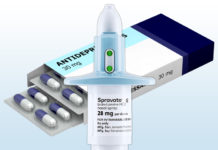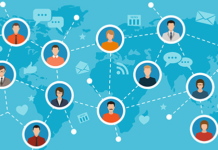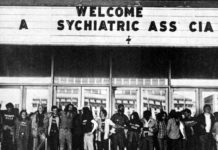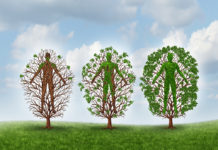Mainstream Mental Health Is Hazardous for Your Mental Health
"Mental health" going mainstream has not actually translated into more connection and healing. Instead, what is mainstream is an individual, isolating notion of "disease."
New Research Questions Safety of Esketamine for Depression
An analysis of FDA adverse event reports related to esketamine shows the potential for negative effects such as suicidal and self-injurious ideation.
Psychiatry and the Counterculture: An Interview with Health Historian Lucas Richert
Richard Sears interviews pharmaceutical industry scholar Lucas Richert about American counterculture and psychiatry in the 1970s.
Researchers: “Antidepressants Should Be Avoided in Bipolar Depression”
New research finds that antidepressants are not effective for bipolar disorder and can worsen symptoms of mania.
Attention! One Morning with a Roving Mind
The day was one long meditation—doing what the mind ordered with no effort to control it. This is the Zen state that monks seek but that physicians consider a mental disorder to be treated by amphetamines.
Dr. Pies and The Chemical Imbalance Deception
Dr. Pies claims that the "chemical imbalance" theory was never really professed by psychiatrists. Yet he himself wrote an essay in "Creative Nonfiction" in 1999 that purveyed it directly to the layperson.
Grief and Its Potential Lessons
Within the current mental health paradigm, profound grief is often shoved into the universal category of depression and treated as a malfunction according to the biomedical model.
Insane Medicine, Chapter 8: Treatment Traps and How to Get Out of Them (Part...
Sami Timimi provides a discussion of the ways medication may be helpful for some, and advice and information on discontinuing psychiatric drugs.
Facebook Groups Provide Psychiatric Drug Withdrawal Help When Doctors Don’t
A new study looks at how online communities provide information and support for patients experiencing psychiatric drug withdrawal.
Can Transcranial Magnetic Stimulation (TMS) Hurt You?
What I was able to learn about the injury inflicted by TMS and the culture surrounding it is an incredible insight into the treatment itself and the nature of the medical model in its current form.
The History of Madness Network News and the Early Anti-Psychiatry Movement
Madness Network News, founded in 1972 by two women inmates of Agnews State Hospital, was an anti-psychiatry journal that served as the focal point for organizing throughout North America, and even overseas.
An American History of Addiction, Part 4: “Drugs Are Bad”
The disease theory of addiction had been ingrained in our culture for 200 years when Nixon signed this law. But had we ever actually checked to see if it was all true?
Now I See a Person: A New Model for Breaking Free of Mental Health...
NISAPI helps people achieve recovery by pairing the normalcy of a ranch and the nurturance of horses with a philosophy of postmodern collaborative practice.
Burning Down the House of Psychiatry During COVID
If there was ever a time to re-evaluate how society deals with human suffering, it is now. The pandemic’s mental health effects strain every false narrative and misguided practice of psychiatry.
Suicide: Shhhhhh
When we have a strong urge to live, it must be very difficult to understand another person’s wish to die. So far, no one has been willing or able to “go there” with me.
Insane Medicine, Chapter 8: Treatment Traps and How to Get Out of Them (Part...
Deconstructing diagnosis, the nature of psychological injury, and how identifying a problem can become a self-fulfilling prophecy.
Finding One’s Way Through Withdrawal
Prescribers are taught to prescribe psychiatric medication, but they are often not well-educated about the effects on patients of discontinuing these medications.
Looking Under the Lamppost: Confinements of the Prevailing Mental Health Paradigm
The mental health field's focus on the biomedical paradigm is like looking for your keys in only one spot, just because it's the most well-lit.
Reckless Psychiatric Treatment Spun Me Out of Control
The mental health treatment I received between 2016-2019 was like an unreliable car that various mechanics had tinkered with. Yet each time I careened into a ditch, nobody looked at the car, just at me.
Insane Medicine, Chapter 7: Industrialised Psychotherapy Markets Western Folk Psychology (Part 2)
Contrasting the folk psychology brands of CBT and McMindfulness with empowering frameworks such as Open Dialogue and the Power Threat Meaning Framework.
The Professionalization of Mental Health Services Is Ruining Friendship
The emphasis on getting "professional" help allows people to abdicate responsibility to their real-life friends, rather than learning how to contribute meaningfully to relationships.
Appealing the FDA’s Denial of ECT’s Harms
More than 200 people signed an open letter to the FDA requesting electroconvulsive therapy’s safety studies and electrical dosing protocols.
Making the Transition to Compassionate Care
I feel my brother was harmed not only by psychiatric drugs, poor nutrition, and dehydration but also by the lack of compassion, social isolation, and dehumanization experience typical of psychiatric facilities.
Insane Medicine, Chapter 7: Industrialised Psychotherapy Markets Western Folk Psychology (Part 1)
Sami Timimi explores the common factors that influence therapy’s success, the evidence base for psychotherapy, and the over-promotion of CBT.
Out of the Bubble: Now or Never?
Never in human history did a powerful institution, no matter how harmful and corrupt, slide into self-inflicted irrelevancy. Institutions like the current psychiatric system can only be toppled by a powerful social movement.

































